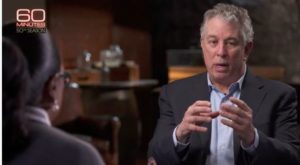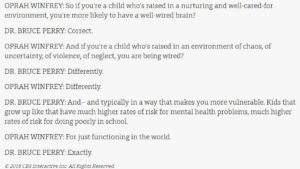Boston Globe News Story Excerpt:
Dr. Bessel van der Kolk, a best-selling author on trauma whose research has attracted a world-wide following, has been fired from his job over allegations that he bullied and denigrated employees at his renowned Trauma Center.
Van der Kolk was removed as medical director of the Brookline center in January, according to several accounts, although his photo and job description remained prominently on its website until early this week, when the Globe requested information. His firing capped a tumultuous three months at the center that van der Kolk founded 35 years ago.
Executive director Joseph Spinazzola, like van der Kolk a longtime advocate for abuse victims, was removed in November over his alleged mistreatment of female employees, executives said. Staff then received a flurry of conflicting emails from executives about the reasons for the upheaval, according to copies of the emails provided to the Globe. Full article.
As you can imagine, I am devastated reading the allegations in the Boston Globe that I have been bullying and denigrating my colleagues at the Trauma Center.
I am also aware that such accusations cannot be entirely pulled out thin air, and that some of you may have felt hurt by me, even though none of you have ever confronted me with such misbehavior. If I have inadvertently denigrated or bullied any of you,I would like to know about it, apologize and make amends.
As you know., I am a strong believer in doing your own personal work, and in my book, the Body keeps the Score, I describe some of that journey for myself,.
If you do not feel that Andy Pond’s insinuations represent reality, I hope you will be vocal and public about how you feel about character assassination, and speak your truth.
Thank you, and I hope to see you all under better circumstances.
Devastatedly yours,
Bessel
I know I’m still reeling from the news about Sherman Alexie which makes my heart ache.
This is always true but most especially as relates to sex, intimacy, procreation, reproduction, parenting, health and well-being These are not all psych issues and can’t be treated as such.
This has been known for some time as people such as Naparstek were not stingy with insight but shared the following with colleagues:
“Naparstek wrote, “let me point to the consistent threads running through these approaches:
1. They first and foremost find ways to re-regulate the nervous system.
2. They destigmatize and normalize the experience by explaining PTS as the somatic and neurophysiologic condition it is.
3. They offer simple, self-administer-able tools that empower the end-user and confer a sense of mastery and control.
4. The interventions are cast as training in skill sets, not the healing of pathology.
So, hopefully those of my colleagues who aren’t up to speed will soon be learning some new skills. “
It’s still sound advice. I have no idea if Naparstek had her feelings hurt or not but it’s clear her goal was in easing the suffering of survivors. Her insights also came from humility and honesty, not hubris. In Invisible Heroes Naparstek writes about being a therapist and observing that her talk-therapy approaches and methods sometimes made survivors feel worse. Unlike many, she did not assume her patients were non-compliant or damaged but looked within to assess her approaches, methods, and effectiveness and to explore new approaches (i.e. guided imagery, body/breath work, etc. etc.). She was aware that some people aren’t willing, wanting or able to go to therapy and need accessible tools to regulate the body and wanted to make that more available to all survivors, especially to veterans returning from combat.
That’s the kind of self-aware leadership survivors require to build trust, heal and feel safe. It’s often lacking in many organizations, treatment models, and approaches and go to a trauma conference if it’s hard to believe this can still be the case. I did in 2014 and was so shocked by what I experienced I changed career direction immediately.
I remember going because it was about 25 years of trauma treatment and I’d been diagnosed with PTSD exactly 25 years earlier. From a survivor and writer perspective, I felt I knew a lot about the phases and stages of treatment and recovery. I couldn’t wait to hear from others. There were no others like me allowed or invited.
I think of Vital Village where the focus is on community capacity building and residents supporting residents, not service providers fixing people. There are those who have saved lives like mine by being unconventional and who I am forever indebted to every one of those people. I hope work like that gets funding, recognition, and respect. It hasn’t always.
Today, I hope they are supported, lifted and held up. May we retire ways that have not supported staff or survivors and that have sometimes even hurt and re-traumatized people.
Maybe survivor academics like Alissa Ackerman, who teach and practice restorative justice, and speak out and listen, will help us?


You Matter Mantras
- Trauma sucks. You don't.
- Write to express not to impress.
- It's not trauma informed if it's not informed by trauma survivors.
- Breathing isn't optional.
You Are Invited Too & To:
- Heal Write Now on Facebook
- Parenting with ACEs at the ACEsConectionNetwork
- The #FacesOfPTSD campaign.
- When I'm not post-traumatically pissed or stressed I try to Twitter, Instagram & Pinterest.
Thought leaders in our profession can be as guilty of hubris and ego inflation as Hollywood luminaries and autocratic politicians. Having original and useful therapy ideas does not guarantee flawless personal character. None of us ever replace all our demons with angels. Individuation starts at birth and persists until death. It’s often a Sisyphus-level nightmare that the pathology people use as fuel for their stigma machinery. Nobody but this man knows the truth of what caused his apparently maladaptive behavior. He was brilliant in one way, harmful in another, just like every one of us to greater or lesser degrees. Name a 19th, 20th or 21st (TBD) century hero who hasn’t acted out, and I’ll send you $10.00.
I can’t disagree with this: “He was brilliant in one way, harmful in another, just like every one of us to greater or lesser degrees” AND it’s disappointing.
Great article.
To me part of what we are seeing here is the reality that a person can be an outstanding teacher or trainer without necessarily having the ability to personally accomplish something perfectly themselves. In physical Sports we see that great coaches of gymnasts aren’t necessarily as physically capable as their students.
This doesn’t invalidate their abilities to teach, or the qualities of their teaching. Out of everyone in the trauma field today, I have found Bessel’s work and teaching by far to be one of the most helpful resources in my work with traumatized clients, and in my own trauma healing.
We all have shadows and it’s very easy for media to hype those Shadows. I feel really sad that from Bessels’ response it appears that nobody spoke to him directly about their concerns before this story broke. This seems inappropriate to me and smells like some kind of politically motivated action.
In the professional working environments that I know, when there’s a problem, protocol standards require that a person be informed thoroughly about the problem and be offered several opportunities to remedy the problem before being fired is even considered!
Dear Trauma Learning:
You may be correct but from what I’ve read I’m not as clear that no one spoke to him as much as that he didn’t hear what was maybe said. But also, a bossy with that much power should not need to be confronted about bullying or denigrating. Some things are subjective but if that’s several staff members saying that, and if it’s been investigated, which has also been said, that’s not the same as not really knowing. It sounds like things did go through channels but if there were underlying and other motives, that I have no idea. But that’s not my first assumption.
Which does not mean I don’t completely agree that he’s a brilliant researcher and has made contributions to the field. We all have a shadow side and that includes those of us in this work (personally, professionally/both).
Thank you for commenting.
Cissy
Thank you so much!! kisses
Thank you for this article. I own Naparstek’s book. ‘Invisible Heroes”. I bought and listened to her guided imagery. It was very healing. Years of traditional therapy made me more traumatized. I quit and searched for alternatives to do on my own that worked for me. I am now healed to a degree I didn’t think possible. I still have more healing to do and more alternative methods to explore. Your article gave me hope to keep trying. Thank you so much. I also did singing for over 2 years. I sang along in a room alone to songs on YouTube etc. I sang songs that allowed me to express my feelings with lyrics or melodies that communicated how I felt but couldn’t find the words. Because I did this alone, I felt completely free of fear of criticism. I even recorded my singing and it helped calm me. Reading about self compassion, narcissism (had many narcissistic abusers), alcoholic families, abuse by siblings and step families, abandonment, attachment issues, and learning new skills helped enormously. I am grateful to the therapists who wrote (mainly women ) caring, nurturing, supportive books to help me heal. The best were by therapists who “listened” to their clients. They acknowledged the learning from their own clients and how they had teach themselves a new way of treatment because what they had been taught didn’t work. I hope soon to explore yoga and other body work. With my abuse history that will be very difficult but with patience and self compassion maybe I can find bodywork. That can help me heal. Now I am exploring writing my story and painting.
It is so sad that the conference you went to didn’t have survivors speaking. I realized years ago no one was listening. Many have egos and pride and have been brain washed in their education to not listen. I hope trauma therapy can advance and move forward from this.
Again, thank you. Extremely affirming and validating points you made.
Dear Survivor: Thank you for this comment. It sounds like you have been scrappy and fierce and creative on your path. YAHOO!! I love this: ” I sang songs that allowed me to express my feelings with lyrics or melodies that communicated how I felt but couldn’t find the words. Because I did this alone, I felt completely free of fear of criticism.” That’s awesome. There are so many genius things/ways people find. It blows my mind. For me, writing gave me that sense of freedom (and I have a shredder for what I just need to let rip and not share). Thank you, again, for commenting! Cissy